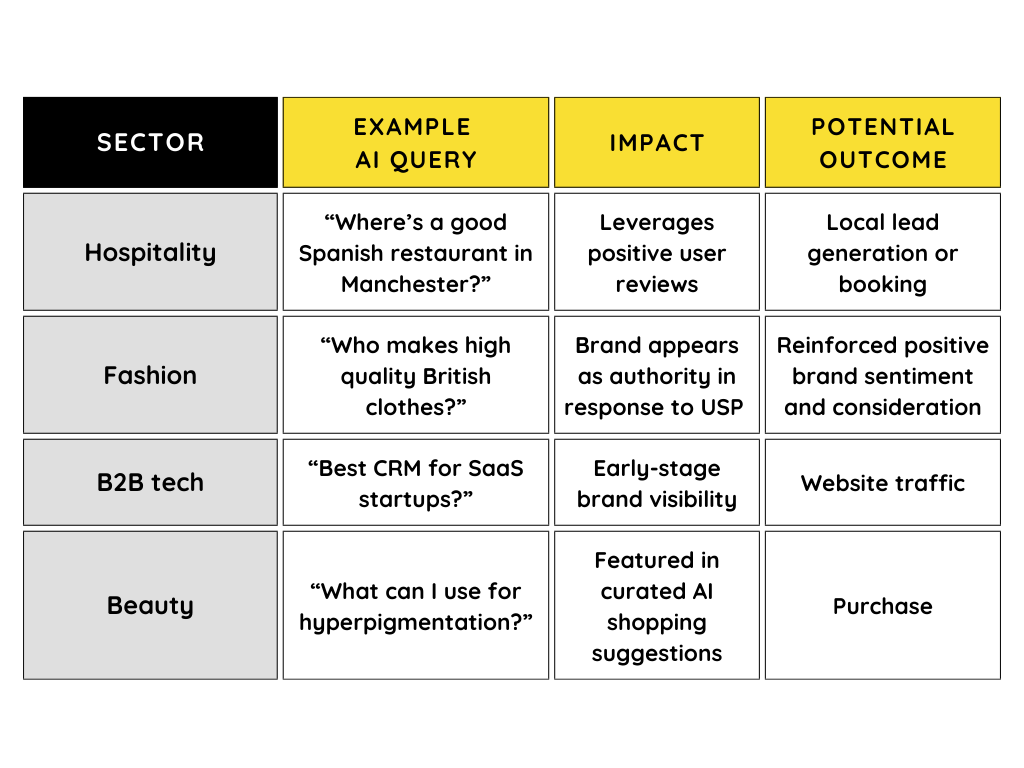Generative Engine Optimisation: The Critical Shift Beyond SEO
How AI Assistants Are Rewriting Search Behaviour
AI has rapidly progressed in capability and popularity since the release of ChatGPT in 2021. Tools like ChatGPT, Claude, and Perplexity are changing how people research products, services, and solutions - and ultimately the way they purchase. AI assistants provide consumers with quick answers, and marketers with a powerful and direct customer journey.
AI’s rise in popularity and ability will soon be matched in its growing influence; harnessing this influence is and will be vital to digital marketers. Data already suggests increasing numbers of consumers are using AI tools to shop - in particular for gifting as we approach Christmas - and the prominence of Google’s AI overview in search results means brands must adapt to a significant shift in both engine and user behaviour.
It’s a major shift. While SEO still plays a key role in discovery, it is no longer the sole element in search and visibility. Brands now need to make sure they’re showing up inside AI-generated responses, not just Google rankings. Generative Engine Optimisation (GEO) ensures your content, branding, and messaging will appear in AI searches - used correctly, GEO can recommend your brand with specific points about both your product and the consumer’s specific pain point. Given the upcoming prevalence and pervasiveness of AI-related conversions, GEO is the proactive strategy to exploit this new channel.
What is GEO?
Despite the shift in practice it represents, the theory of GEO is highly similar to SEO. Both target a brand’s visibility, sentiment, and credibility to its target audience. Both encompass technical, visual, and written elements of your public digital content. The main - but not only - aim of GEO is to optimise your public digital content to encourage AI to read, interpret, and recommend your brand to a possible consumer. While traditional SEO is designed to help search engines rank your pages, GEO ensures generative AI tools can find, understand, and recommend your brand.
Here’s how generative engines work differently from search engines:
- They synthesise and quote content from multiple sources rather than ranking pages
- They seek accessible, quotable, relevant, and detailed information
- They can pull data from websites, social media, reviews, forums, product pages, Reddit threads
- They convey a sentiment directly to the consumer
- They prioritise authoritative sources and look for expertise, not just keyword matches
If your brand isn’t represented in sources AI trusts—or if your content isn’t structured in a way AI can interpret—you won’t be part of the conversation. Every query passed through a generative engine like Claude where your competitor appears above you is a lost opportunity for traffic, consideration, and conversion.
Why is GEO important?
It’s easy to assume SEO is still the primary gateway to visibility—but attention is shifting fast. Generative engines are now part of the customer journey, from discovery to decision-making. Instead of scrolling through search results, users are asking AI assistants for answers—and trusting those answers.
Here’s why GEO matters now:
1. You appear in the answer
AI tools don’t just suggest you—they explain why you’re the right choice, often with a link, product name, price, and key benefits built in.
2. You shape decisions earlier
By showing up in the AI’s response, your brand enters the conversation before users even get to a search engine or website.
3. You build trust through relevance
AI assistants act like personal advisors. When your product is the one they recommend, it lands with more authority.
Who needs GEO?
Already conversions - purchases, referrals, and bookings - have come through AI GUIs like ChatGPT, Claude, Perplexity, and increasingly Grok. Without optimising for this change, brands will be left behind as AI replies to the consumer with a competing brand. While GEO is a natural fit for services or complex purchase decisions, its potential encompasses every industry:

How do generative engines choose what to show?
Search engines rank links and pages for relevancy and keyword matching. Generative engines read and interpret content. Assistants, true to their name, can be a personal shopper with all the information a consumer could need. But this is only if that information is quick and easy for AI to access - if it’s well-structured, accessible, and relevant.
AI pulls information from the whole web, rather than specific pages or sites:
- Website blogs and product descriptions
- Reviews, Reddit posts, and Quora answers
- Media articles and press releases
- Social media posts and tags
What does an effective GEO strategy look like?
It’s not about adding more content—it’s about structuring it for AI to understand, trust, and reuse.
1. Structure & formatting
Use schema, headings, subheadings, and internal linking. Break information into tables, Q&As, and concise lists that AI can easily pull from.
2. Question-based phrasing
Frame blog titles and product pages around actual user questions:
“How does hyaluronic acid work with retinol?” > “Skincare ingredients guide”
3. Understand how AI behaves
Know what format AI typically uses in your category—product lists, side-by-side comparisons, booking suggestions—and make sure your content aligns.
4. Incorporate user content
AI often cites user-generated reviews. Use that to your advantage:
- Mine reviews, Reddit threads, and forum posts
- Mirror real customer language
- Address concerns directly
5. Sync your content across channels
- Reinforce the same brand messages across your website, social, and product pages.
- Align social posts with key GEO themes.
- Keep your schema up to date.
Getting started with GEO
Generative engine optimisation should be structured around these three vital stages:
- Ask AI tools the questions your customers ask
See if your brand appears—and how it’s represented. - Audit your content
Is it AI-readable, structured, and trustworthy? - Start optimising
Update key pages, create Q&A-focused blogs, improve your schema, and align messaging across your channels.
If your brand isn’t mentioned on Reddit or review sites, getting high-quality and detailed mentions there can improve AI visibility dramatically.
After the first steps, expanding your strategy to actively tracking your brand’s performance in AI visibility, sentiment, citations, and the context your brand appears in is essential. Using tools like Rankscale alongside GA4 tracking streamlines the process, providing comprehensive tools to optimise your brand’s perception in a rapidly-changing milieu of SEO, GEO, and organic search.
GEO and SEO: not rivals, but partners
SEO keeps you visible on Google while GEO makes you part of the answer inside AI. Both are essential, especially on Google - not only does SEO keep your position high and your website discoverable, but AI Overview is often bypassing SEO rankings. Appearing in the top AI response and the top position ensures your brand stays visible in every digital customer journey.
At all scales, maximising performance in all channels - and boosting organic traffic and brand perception - has always been vital. Now, GEO is the newest branch of performance marketing strategy.

